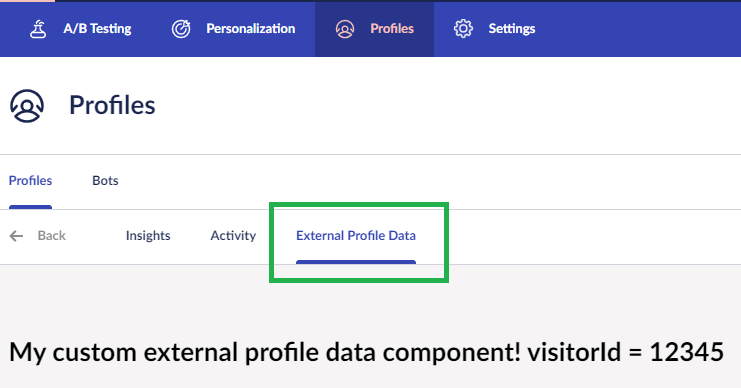External Profile Data
Note: this functionality is available starting from v1.12.0
Your system may associate a uMarketingSuite visitor with other data that comes from some external system such as a CRM. Note uMarketingSuite does not provide a built-in way to add additional data to a profile. You can store the data in any format and in any way you want. If this external data is to be used in a custom segment you write the data access yourself in the custom segment code that you had to write to begin with.
Visualization
It is possible to visualize this external data alongside the uMarketingSuite profile in the backoffice by providing a custom AngularJS component for this purpose.
When this component is registered a new tab will be rendered in the Profiles section when viewing profile details which will render the custom component that was provided and gets passed the uMarketingSuite visitor id.

Register your custom component
In order to render this External Profile Tab with a custom component, you only have to create your component and register it with uMarketingSuite. The following code will show how to do both. Simply put this code in some .js file in App_Plugins and load the in the usual way using a package.manifest file.
// If you have your own custom module, you can use this:
// angular.module("myCustomModule", ["uMarketingSuite"]);
// angular.module("umbraco").requires.push("myCustomModule");
// angular.module("myCustomModule").run([ ... ])
// Create a component. We create a component named "myCustomExternalProfileDataComponent" here:
angular.module("umbraco").component("myCustomExternalProfileDataComponent", {
bindings: { visitorId: "<" },
template: "<h1>My custom external profile data component! visitorId = {{$ctrl.visitorId}}</h1>",
controller: [function () {
this.$onInit = function () {
// Your logic here
}
}]
});
// Register your custom external profile data component.
// Please note you have to use kebab-case for your component name here
// just like how you would use it in an AngularJS template (i.e. myCustomComponent -> my-custom-component)
angular.module("umbraco").run(["umsCustomComponents", function (customComponents) {
customComponents.profiles.externalProfileData = "my-custom-external-profile-data-component";
}]);
That's all that's required to render your custom component.